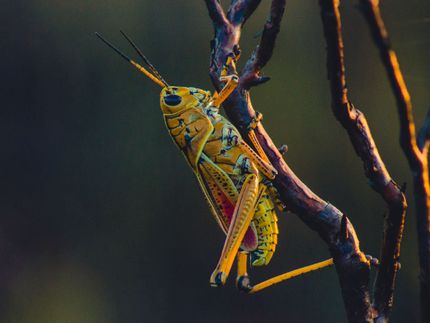Eating grasshoppers and mealworms - yuck
European research project investigated the acceptance of insects as food in three countries
Acceptance of foods made from insects is very low in Germany, Italy and Portugal. This was the finding of a representative survey in these three countries conducted as part of the EU research project "Sustainable Insect Chain" (SUSINCHAIN). Respondents are hardly willing to spend money on food made from insects. "On the contrary, they even think there should be a financial incentive or some kind of premium to reach for insect-based foods," says Mariam Nikravech, a research associate at the TU's Department of Education for Sustainable Nutrition and Food Science, who was responsible for the representative study.
With the world's population expected to grow to 9.1 billion people by 2050, other sources of protein need to be developed for both food and feed. Insects could be suitable for this. They are rich in proteins, minerals and vitamins. And their production would be less harmful to nature than conventional farming of cattle and pigs. To produce one kilogram of mealworms, only ten percent of the area needed to produce one kilogram of beef is required.
Agreement slightly higher
Among other things, the respondents were asked to choose between meatballs consisting of grasshoppers and mealworms as the main ingredient and meatballs made from meat from chickens that had been fed insects. This showed that acceptance was slightly higher for meat from chickens that had been fed insects than for meatballs made only from insects.
"The results of our sample confirmed findings from other surveys regarding low acceptance in Europe. However, we also wanted to find out if and how acceptance could be increased," says Mariam Nikravech.
Additional information can have a positive effect
The researchers* therefore provided respondents with additional information, for example, that minced meat can be replaced by meat-free alternatives, including insect proteins, thereby reducing greenhouse gas emissions and eating more sustainably. In Portugal, this information increased acceptance of meat substitutes made from mealworms. In Italy, the additional information on sustainability had a positive effect only on the acceptance of mealworms, and in Germany, it had a positive effect on insect-fed chicken and on the acceptance of grasshoppers. "In contrast, the reference to insect protein content did not cause a boost in acceptance in either Germany or Italy," summarizes Mariam Nikravech.
It was also shown that trust is an important factor influencing acceptance. "People who consider food made from insects to be safe, i.e. do not see it as harmful to health, are more likely to buy such food," says the political scientist.
Inexplicable disparity among "never-takers"
And then there are the so-called "never-takers," i.e. those who would never eat food made from insects. "In Germany and Portugal, of the 500 respondents in each country, they were a majority: 64 percent in Germany and 58 percent in Portugal. But in Italy, these 'never-takers' made up only two percent. That was surprising, but we can't yet explain the disparity between the countries," the researcher says.
It's disgust and fear, fear of getting sick from such foods, that account for the rejection. Statements about insect-based foods being an expression of a modern urban lifestyle left Germans, Portuguese and Italians equally unimpressed.
But even among this group, the research team tried to find out if there was any leverage to break down the refusal. Says Mariam Nikravech, "It was mainly the information that insects are richer in protein and minerals than meat that made the 'never-takers' more open." To soften the fundamental refusal of the "never-takers," she says, it is above all important that they come into contact with insect-based food and have the opportunity to taste it.
Her conclusion: additional information is definitely a lever to increase the acceptance of insects as food in Europe.
In each of the three countries, 500 people were surveyed, 51 percent women, 49 percent men between the ages of 18 and 65.
Note: This article has been translated using a computer system without human intervention. LUMITOS offers these automatic translations to present a wider range of current news. Since this article has been translated with automatic translation, it is possible that it contains errors in vocabulary, syntax or grammar. The original article in German can be found here.
































































